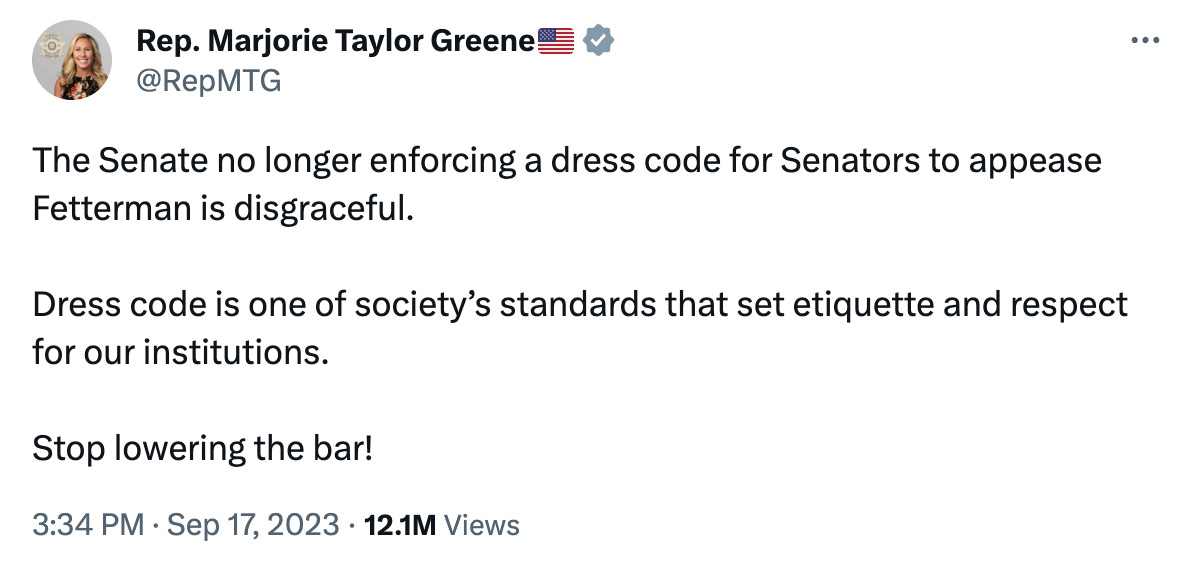NATO Ups Defense Spending—Here’s Who to Thank
Plus: The worst-dressed workplace in America gets a new dress code.
Good afternoon and welcome to Press Pass, The Bulwark’s twice-weekly newsletter on Congress, campaigns, and the way Washington works (or doesn’t work). If you aren’t already a member, sign up for Bulwark+ today; you won’t want to miss our coverage of the chaos that is coming when government funding expires at the end of this month. We’ll have more on the latest developments in Thursday’s edition, which is exclusively for subscribers.
In today’s newsletter, we’re looking at two items—one serious and consequential, one silly and controversial. First, NATO partners have recently ratcheted up their defense spending, which Americans in both parties have wanted for years. Second, the Senate scrapped its dress code, and some would now have you believe the entire world is falling apart. All that and more below.
Every twentieth-century U.S. president urged the members states of the North Atlantic Treaty Organization (NATO) to spend more on defense, but Donald Trump in particular hammered at this, haranguing their leaders to dedicate at least 2 percent (or 4 percent) of gross domestic product to defense spending, and even considering pulling the United States out.
Trump was correct about the need for more countries to chip in, even if his remarks on the issue were consistently, needlessly belligerent. Most members don’t meet the 2 percent threshold, which makes the organization reliant on just a handful of countries, and according to many foreign policy experts, this leaves everyone less safe from external threats like Russia and China.
As right as Trump was about the need, his demands didn’t actually do much to ramp up our allies’ defense spending. But during Joe Biden’s White House tenure, several countries have done just that. This isn’t necessarily the result of a more successful strategy from Biden; it instead speaks to how unsafe a lot of Europeans are feeling in the wake of Putin’s illegal invasion of Ukraine, where his army continues to commit war crimes.
According to data released by NATO in July, the organization has seen significant increases in defense spending among European partners since the onset of the war in Ukraine. Of the 31 NATO countries, 11 are spending above the 2 percent goal, with most others not far behind. Sweden, which is on its way to becoming a NATO member, is slated to be spending 2.1 percent of its GDP on defense by next year.
Since the Russian invasion, the rise in the percentage of GDP that NATO members spend on defense has been dramatic. According to Air & Space Forces Magazine:
In the 16 months since Russia invaded Ukraine, NATO as a whole has also seen an overall eight percent real increase in defense spending above inflation, compared with two percent in 2022. In the same period, overall NATO member spending on equipment leaped from 8.5 percent real growth to 24.9 percent of real growth above inflation.
“When there’s an invasion in your neighborhood, it causes more defense spending,” as Sen. Marco Rubio (R-Fla.) aptly put it.
When I spoke to Sen. Brian Schatz (D-Hawaii) about this upward trend, he credited both Putin’s recklessness and Biden’s leadership.
“We’re very fortunate to have a president who was also a chairman of the Senate Foreign Relations Committee and knows all the players,” he said. “So when the war started, he didn’t have to build relationships with his fellow heads of state. He could just get on the phone with them and organize the free world.”
Sen. Ben Cardin (D-Md.), a longtime member of that committee, said there’s still quite a ways to go.
“We’ve been working on this for a long time. We’ve been trying to get to 2 percent—that’s the standard,” he said. “I think Ukraine is certainly one of the driving forces, but I think it’s been an ongoing challenge that we’ve been trying to get these countries to up their game, and they are.”
With the largest European war since World War II continuing without a clear end in sight, NATO is more relevant than ever. Putin’s actions have inspired members to get more serious about their defenses, and at least some American officials are taking notice.
The Devil Wears Carhartt
Less than one week after the conclusion of New York Fall Fashion week, Senate Majority Leader Chuck Schumer quietly nixed the dress code for senators in the chamber. And by quietly, I mean he leaked the information to a national news outlet.
This means male senators are no longer required to don the customary jacket and tie before stepping onto the Senate floor. Women’s attire has always been more fluid and therefore harder to define or restrict, but you would probably know a violation if you saw it.
Schumer’s move was thought to appease freshman Sen. John Fetterman (D-Pa.), who has become known for his extremely casual attire. Fetterman regularly sports gym shorts1, hoodies, and clearly lived-in Carhartt work shirts. He skirted the earlier rules on attire in the chamber during votes by popping his head in the door when his name was called and signaling a thumbs up or down to the clerk2.
It’s fine to desire a consistent dress code for everyone, not just senators; to expect elected officials to dress with an appropriate sense of decorum; and to be a bit put off by the recent change. But it’s also quite silly to be upset about the relaxed dress code for any longer than you’d be upset about spilling a bit of coffee on your tie. Nevertheless, a lot of folks have made much of their feelings of irritation over the idea that a lawmaker might be allowed to dress differently while legislating.
“The Fetterman legacy is now cemented,” declared conservative columnist Joe Concha. “Not for improving the lives of the state he represents, of course, but because he dresses like a sophomore in summer school.”
Rep. Marjorie Taylor Greene (R-Ga.) decried the lack of “respect for our institutions.”
Fox News ran multiple segments on the topic, including commentary from renowned sartorialist Karl Rove. Sen. Susan Collins (R-Maine) lamented that she could now wear a bikini on the Senate floor if she wanted. (She clarified that she won’t, “But the fact is, as I understand it, I could!”)
In response to the backlash, Fetterman gaggled with reporters before votes Monday evening, saying, “I appreciate it, and it should be bipartisanship. Like, who really loves to wear a suit?”
“I think we should all want to be more comfortable, and now we have that option, and if people prefer to wear a suit, then that’s great,” he added.
Fetterman’s casual attire has been a magnet for attention (both positive and negative) because not only is it more relaxed than any other lawmaker’s style of dress, but the man is also simply a massive human being; everything he does is easy to notice. That said, it’s not as though every other lawmaker is dressed to the nines. Many wear sneakers (or those awful sneaker/dress shoe hybrids), rumpled slim fit chinos, and mismatched pieces like a navy jacket with a slightly darker navy pair of pants. It’s all quite terrible. I’d personally prefer to see good style dressed down than bad style dressed up.
My non-expert opinion is that the best-dressed senator is Rev. Raphael Warnock (D-Ga.). He clearly has a good tailor and wears high-quality, well-fitting suits. He also avoids big flashy items and colors that might convey something other than “I’m here to legislate.” Sen. Rand Paul (R-Ky.) has the most memorable personal style in the upper chamber. But Warnock and Rand are outliers in the Capitol.
Derek Guy, known online as “the Twitter Menswear Guy,” summed it up well in a recent post:
Very few senators have the skill, and that’s totally fine. They have more important things to worry about.
I don’t think shorts should ever be worn in an office or on an airplane, and I have an equally rigid view on their proper length.
I’ve seen multiple senators do this over the years when they’re not in accordance with the dress code, even when it’s as simple as forgetting to wear a tie. But Fetterman has made it standard procedure.






“Etiquette and respect for our institutions” from MTG? Is this a joke or irony? From the Congresswoman who literally shouts at President Biden during a State of the Union address?
While as an old fart, I like and respect formality, it's really a matter of personal style...and as Derek Guy pointed out by his penmanship analogy, attire isn't cognitive function nor behavior, which, really, are personal style on their own. (And, for the record, MTG hasn't been all that particular about her sartorial choices on occasion.) The levels of cognitive function and behavior currently on display suggest that the old school suit and tie is, indeed, now not so compatible with what's going on, in both parties. Maybe for some a hospital gown? For others, a clown suit?
For whatever it's worth, I care a great deal less about how my senators and representative attire themselves than I care about what they do. Maybe they should consult a text on classical Roman garb as to styles for gladiators? Or how about diapers and burp bibs? Jeans and T-shirts would be fine with me if that'd make them comfortable enough to do real, adult work. But being a thinking adult is...hard.